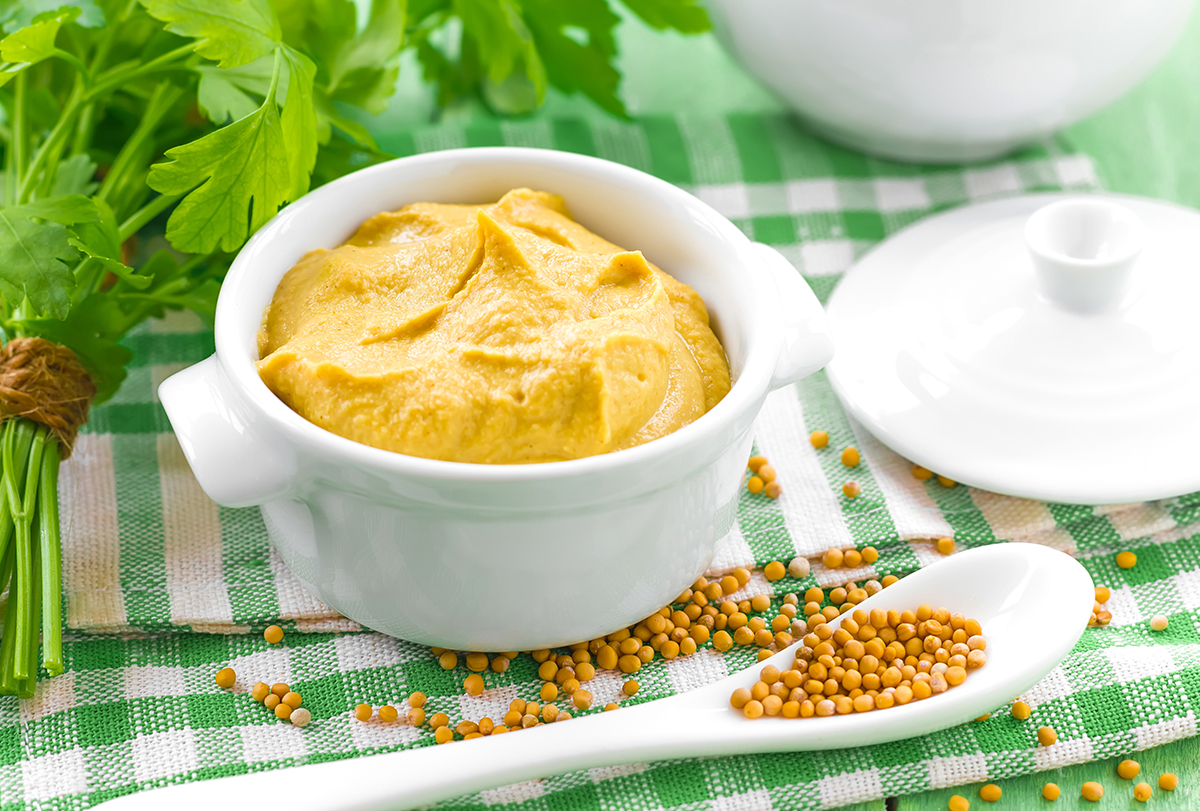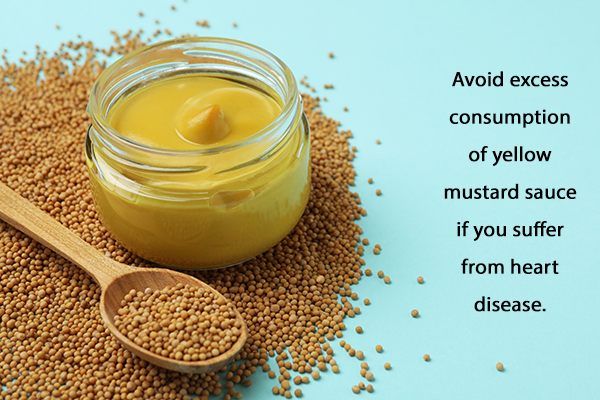In this article:
You might be familiar with yellow mustard as a drizzle on your hotdogs, filling in your sandwiches, and a layer in your hamburgers. Yellow mustard is a condiment popularly used in fast foods, but the indispensable health benefits it offers put it a notch above other seasoning.

Belonging to the broccoli family, yellow mustard seeds are tiny round seeds of the mustard plant. It’s available as a sauce or oil, seed, or powder, all of which offer excellent health benefits. (1)
Yellow mustard seeds, oil, and greens are widely used for culinary purposes in different parts of the world. Yellow mustard sauce is a low-calorie sauce (only 3 calories in 1 teaspoon… that low!) and can be used as a healthier substitute for mayonnaise.
Yellow mustard is very versatile in nature. Besides being a healthy condiment, it is accredited with numerous health benefits as an analgesic, antimicrobial, anti-inflammatory, and decongestant.
Origin of Mustard
One of the many variants of mustard, yellow mustard is a cruciferous vegetable belonging to the Brassica family. Presently standing as a popular spice, mustard seeds, oil, and greens have been around as a kitchen ingredient and home remedy for more than a thousand years.
A native to the temperate regions of Europe, mustard is believed to be cultivated initially in Asia and North Africa. It has been popularly used as a remedy to treat health issues in ancient Greek and Roman civilizations.
Nutritional Value of Yellow Mustard
Yellow mustard is brimming with protein, fiber, vitamin C, omega-3 fatty acids, and many of the B complex vitamins. It is particularly rich in several minerals including potassium, phosphorous, calcium, and magnesium, which are essential for good health. (2)
The vast array of health benefits extended by yellow mustard come from its rich nutritional profile.
Nutritional content of mustard per 100 g:
| Nutrient | Quantity | Amount |
|---|---|---|
| Water | g | 83.72 |
| Energy | kcal | 60 |
| Protein | g | 3.74 |
| Total lipid | g | 3.34 |
| Carbohydrate | g | 5.83 |
| Fiber | g | 4 |
| Sugars | g | 0.92 |
| Calcium, Ca | mg | 63 |
| Iron, Fe | mg | 1.61 |
| Magnesium, Mg | mg | 48 |
| Phosphorus, P | mg | 108 |
| Potassium, K | mg | 152 |
| Sodium, Na | mg | 1104 |
| Zinc, Zn | mg | 0.64 |
| Vitamin C | mg | 0.3 |
| Thiamin | mg | 0.177 |
| Riboflavin | mg | 0.070 |
| Niacin | mg | 0.565 |
| Folate | mcg | 7 |
| Vitamin A | mcg | 5 |
| Vitamin E | mg | 0.36 |
| Vitamin K | mcg | 1.4 |
Healthy Perks of Adding Yellow Mustard to Your Diet
If you are not aware of the health benefits of yellow mustard, it’s time for you to learn what it has to offer.
Let’s walk over the bevy of benefits that mustard brings, whether you consume it in the form of seeds (whole or ground) or as a sauce or you topically apply its oil.
1. Relieves muscle spasms

You can use yellow mustard to get quick relief from any kind of muscle spasm, be it on the back or shoulder. The stimulating action of yellow mustard on the nerves helps relieve the muscle spasm.
It is also a good source of potassium and calcium, two essential nutrients required for maintaining healthy bones, joints, and muscles. (3)
Mustard seeds are known to relieve the pain of rheumatic arthritis due to its selenium and magnesium content. (4)
How to use:
Eat 1 teaspoon of yellow mustard paste with a glass of water. Repeat this remedy until needed.
2. Cures body aches
You can use mustard oil made from yellow mustard seeds to relieve any kind of pain, including arthritis pain.
Mustard oil works against pain receptors in the body, which means it can effectively block pain signals. (5)
How to use:
- Use warm mustard oil to massage your affected areas for 10 to 15 minutes. Do these two to three times a day.
- Make a poultice of mustard seeds and apply it on the painful region. Use a thin towel between your skin and the poultice to prevent burns.
3. Combats bad breath
Yellow mustard is a simple yet active natural ingredient to get rid of bad breath, including the one from alcohol. The strong aroma of mustard sauce will mask the bad odor coming from your mouth. (6)
How to use:
Put 1 teaspoon of yellow mustard sauce in your mouth, swish it around for a minute and then spit it out. Next, swallow 1 teaspoon of mustard sauce. Rinse your mouth thoroughly with water.
4. Encourages heart health

Both the yellow mustard greens and oil can be used to improve your heart health.
Being rich in monounsaturated and polyunsaturated fats, mustard oil can help balance your cholesterol levels. It reduces the low-density lipoprotein (LDL or “bad” cholesterol) level and increases the high-density lipoprotein (HDL or “good” cholesterol) level in the body, thereby reducing your risk of cardiovascular diseases. (7)
Also, the leaves of the mustard plant have tremendous cholesterol-lowering power. (8) It can bind bile acids in the digestive tract, facilitating the easy excretion of the acids from the body.
How to use:
Add mustard greens to salads, soups, and stir-fries or just use pure mustard oil for cooking.
5. Soothes cold and cough
Owing to its pungent nature, mustard oil is an excellent remedy for a cold or cough. Being naturally warm, it acts as a natural decongestant. (9)
With its high manganese and iron content, consuming mustard greens and sauce can help strengthen your immune system and prepare you for the cold and flu season. (10)
How to use:
- Heat mustard oil and add a few chopped garlic cloves. Heat the oil until the cloves turn brown. Strain the oil once it is cool. Massage your chest, the soles of your feet, back, and palms with this oil two to three times a day
- To a pot of boiling water, add 1 teaspoon of caraway seeds and 2–3 teaspoons of mustard oil. Inhale the steam to clear the phlegm buildup in the respiratory tract.
6. Strengthens bones and teeth
Believe it or not, including a little bit of yellow mustard can help a lot in keeping your bones and teeth healthy.
Yellow mustard packs a punch of nutrients such as calcium, phosphorus, manganese, and magnesium, which are very good for your bones and teeth. (11)
For instance, calcium is vital for your teeth and bones, keeping them strong. A low calcium level can adversely affect the health of your bone and teeth.
How to use:
Eat 1 tablespoon of yellow mustard powder daily with a glass of water to maintain the health of your bones and teeth.
7. Promotes hair growth

The many vitamins that mustard contains support strong and healthy hair growth. Notably, the presence of beta-carotene, protein, iron, and calcium encourages healthy hair growth. (12)
When used as hair oil, it stimulates hair growth by increasing blood circulation in the scalp.
How to use:
Warm mustard oil enough for your hair. Apply this warm oil on your scalp working on the roots of your hair down to the tips. Keep massaging for at least 10–15 minutes. Leave it on for a couple of hours or overnight. Wash it after. Use this remedy whenever you have to go for a hair wash.
8. May prevent cancer
Mustard contains phytochemicals called glucosinolates. The presence of enzyme myrosinase helps in breaking down glucosinolates into isothiocyanates. These isothiocyanates are promising agents that can neutralize carcinogens.
A study in 2011 conducted on female rats supported the use of mustard seed powder to inhibit the growth and muscle invasion of bladder cancer. (13) You can get these benefits just by using pure mustard oil for cooking and adding mustard greens to salads, soups, and stir-fries.
Varieties of Mustard
Out of the many varieties of the multifaceted mustard, white mustard (Brassica alba), brown mustard (Brassica juncea), and black mustard (Brassica nigra) are well known to the masses and widely used for consumption and health.
White mustard or yellow mustard finds its origin in the Mediterranean. It has a mild taste and is used to prepare the American yellow mustard condiment. Black mustard is known for its robust aroma and flavor. The sharp, pungent taste of the brown mustard is used to prepare Dijon mustard.
Dijon mustard, American yellow mustard, and honey mustard are among the most popular varieties.
How to Enjoy Yellow Mustard?
Being an essential ingredient in Indian culinary practices, yellow mustard is a powerhouse of both flavor and nutrition. It can be used in your dishes in varied forms as whole seeds, oil, and powder to makes dips and sauces.
- You can use the seeds as tempering in your curries to add a final touch to your preparations.
- Use the oil of yellow mustard in your cooking practices.
- Impart a rich flavor to your vinaigrette dressing by adding Dijon mustard seeds.
- Season your rice with crackled yellow mustard seeds.
- Stir-fry yellow mustard greens in clarified butter and sprinkle it with a pinch of salt and black pepper.
- Prepare a sweet dip by combining mustard, honey, and seasonings of your choice.
- Mustard and flaxseed oil dressing: Blend 1/3 cup of lemon juice, 1 tablespoon of Dijon mustard, 2 cloves of garlic, and salt and pepper to taste until you get a smooth paste. Pour ¼ cup of flaxseed oil and ¼ cup extra virgin oil through the lid and blend again. Use this dressing in your salads.
- Mustard marinade: Use 2 cloves of garlic, 2 shallots, 5 tablespoons of Dijon mustard, and a few sprigs of thyme. Blend to a smooth paste. Use this as a marinade to bake or grill your fish fillets, chicken breasts, or pork.
- Millet salad: To boiled millet grains, add crackled mustard seeds, garden peas, baked tofu, scallions, and vegetables of your choice. Add lemon juice and olive oil as a dressing for your salad.
Precautions With Yellow Mustard

Although yellow mustard is incredibly beneficial to your health, you need to be cautious of your intake of mustard seeds to avoid any adverse effects.
- Avoid mustard seeds if you are allergic to it.
- Avoid excess consumption of yellow mustard sauce if you suffer from heart disease.
- Excessive intake of mustard sauce can cause digestive problems.
- Uncooked mustard seeds contain compounds that can disrupt the production and function of thyroid hormones. Consider consuming cooked mustard seeds if you have thyroid problems.
- Avoid mustard if you have been diagnosed with kidney or gallbladder conditions. Mustard seeds are rich in oxalates, which block the absorption of calcium. Oxalates can accumulate in body fluids, crystallize, and cause other health issues and aggravate an existent case of kidney stones or gallbladder stones.
- Keeping in mind the lack of any research and the safety of both mother and child, it is best advised that pregnant and breastfeeding women should limit their intake of yellow mustard seeds.
Important Points
- Being warm, mustard may increase your body temperature, which is a reason to consume it in moderation.
- You can prepare mustard sauce at home and flavor it with spices, such as pepper, garlic, or paprika, along with a dash of salt.
- Do not confuse mustard oil with mustard essential oil.
- Ensure that your mustard oil is not adulterated with argemone oil, as it can be dangerous to your health. (14)
Final Word
Yellow mustard has been revered since time immemorial for its contributions to the kitchen table as well as being a home remedy. A worthy addition in your spice cabinet, yellow mustard is loaded with vitamins, antioxidants, healthy fats, and minerals that can help you achieve good health.
Yellow mustard is a common household name in America and is savored in snacks, dips, and sauces. Hence, it is necessary to be acquainted with the health benefits bottled in your mustard sauce.
Instead of submerging your plates with the yellow mustard condiment, stick to the serving size. Crackle yellow mustard and add it as tempering in your fish curries, season your salads and soups with it, and include it in your fish fillet marinade to reap the benefits present in these tiny seeds.
- Was this article helpful?
- YES, THANKS!NOT REALLY


